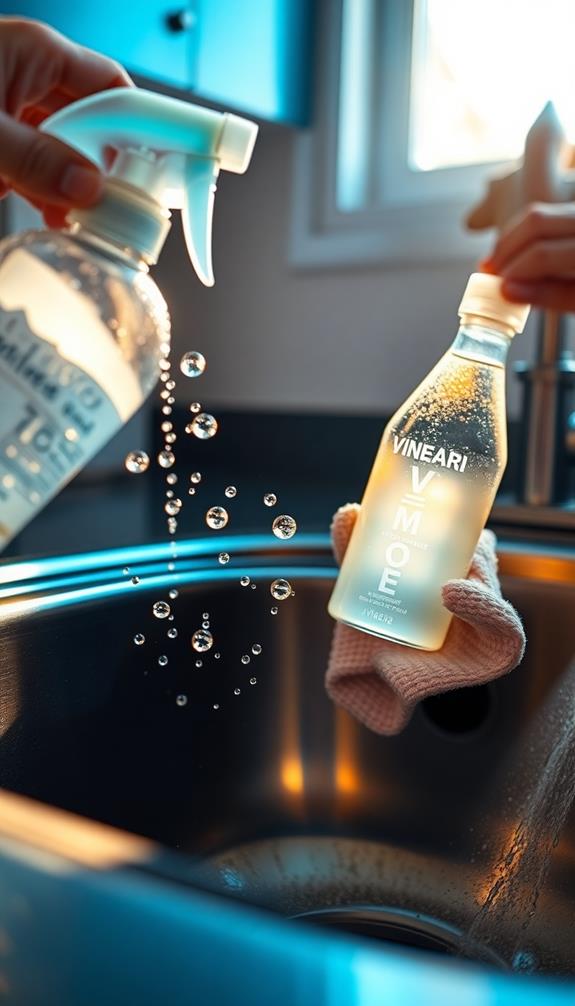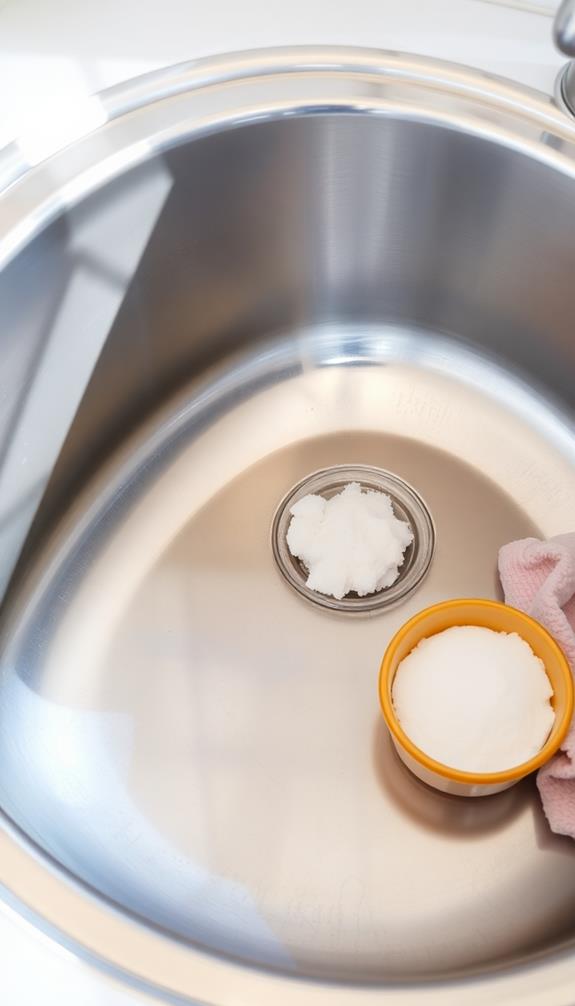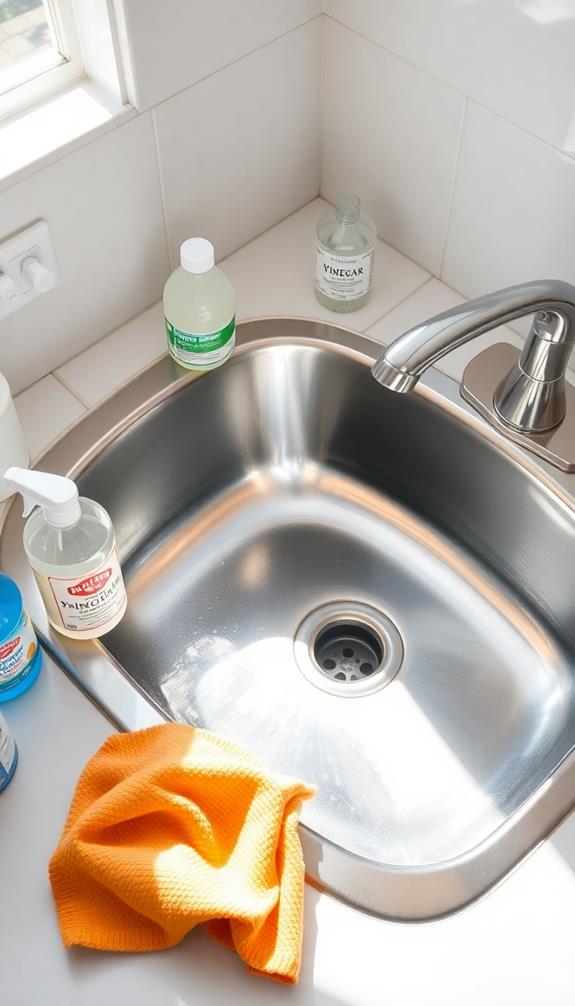To remove hard water stains from stainless steel, you've got a few effective hacks. Start with a mixture of equal parts vinegar and water in a spray bottle. Spray it on the stains, let it sit for 5-10 minutes, then scrub gently with a microfiber cloth. You can also rub half a lemon on the stains and rinse after it sits for a bit. For a more abrasive approach, mix baking soda with water to form a paste, apply it, scrub, and rinse. Regular cleaning will keep your surfaces shiny and enhance their lifespan—there's more to discover on maintaining stainless steel!
Understanding Hard Water Stains
Hard water stains can be a pesky problem for your stainless steel surfaces. These stains occur when hard water, which contains high levels of dissolved minerals like calcium and magnesium, leaves behind mineral deposits as it evaporates.
You'll notice these appear as white, cloudy spots and streaks on your stainless steel surface, detracting from its shine and aesthetic appeal. Regular cleaning is essential to prevent the buildup of hard water stains, as methods like using natural alternatives can effectively break down deposits.
If you neglect these stains on stainless steel, they can become increasingly stubborn and difficult to remove. Over time, untreated hard water stains may lead to corrosion, which compromises the integrity of your stainless steel sinks and fixtures.
It's crucial to understand that while these stains can be challenging, they're manageable with a consistent cleaning routine. By staying on top of cleaning stainless steel surfaces, you can maintain their appearance and longevity, ensuring that your kitchen and bathroom remain beautiful and functional.
Don't let hard water stains ruin the look of your stainless steel; make cleaning a priority!
Essential Cleaning Materials
To effectively tackle hard water stains on stainless steel, you'll want to gather a few essential cleaning materials that make the job easier and more efficient.
Start with white vinegar, a natural acidic cleaner that dissolves mineral deposits, making it ideal for hard water stains. Not only does vinegar serve as an effective stain remover, but it also enhances the effectiveness of other natural cleaning agents, such as baking soda's gentle abrasiveness.
Next, grab some baking soda; when mixed with water to form a paste, it acts as a gentle abrasive, perfect for lifting stubborn stains without scratching your stainless steel surface.
Don't forget microfiber cloths—they're soft and effective for cleaning and drying, preventing scratches while trapping dust and grime.
While you're at it, consider using lemon juice, which contains citric acid that breaks down hard water stains and leaves a fresh scent behind.
For an extra shine, you can also use club soda; its carbonation can help lift stains and enhance the shine of your surfaces.
With these essential cleaning agents on hand, you'll be well-equipped to clean your stainless steel sink and tackle any hard water stains that come your way.
Cleaning With Vinegar

When it comes to tackling hard water stains, vinegar's cleaning power is hard to beat. Its natural antimicrobial properties not only help in breaking down those stubborn mineral deposits but also disinfect the surface as you clean.
You can easily apply a vinegar solution to the affected areas, letting it sit to break down those stubborn mineral deposits. After scrubbing and rinsing, you'll guarantee your stainless steel stays shiny and stain-free.
For best results, consider combining vinegar with eco-friendly methods to enhance your cleaning routine.
Vinegar's Cleaning Power
One of the most effective ways to tackle hard water stains on stainless steel is by using vinegar, which packs a powerful punch against mineral deposits.
The high acetic acid content in white vinegar breaks down these stubborn stains, making your cleaning job easier. To start, mix equal parts vinegar and water in a spray bottle. This solution will help you target those pesky stains directly on the stainless steel surface.
Spray the mixture onto the stained area and let it sit for about 5-10 minutes. This waiting period allows the vinegar to work its magic on the mineral deposits.
Afterward, grab a microfiber cloth or sponge and scrub the affected area gently. You'll notice how the stains begin to lift away.
Application and Rinsing Process
Apply the vinegar solution generously to the stained areas, making sure you cover every spot affected by hard water deposits.
To prepare the solution, mix equal parts of white vinegar and water in a spray bottle. Once applied, let it sit for 5-10 minutes to effectively break down mineral deposits.
Next, gently scrub the stained surface using a microfiber cloth or sponge. This helps lift the stains without scratching the stainless steel.
After scrubbing, it's essential to rinse the area thoroughly with clean water. This step guarantees all vinegar residue is removed, preventing any potential for new stains.
Finally, dry the surface with a clean microfiber cloth to eliminate moisture. This will help avoid future hard water spots from forming.
Here are some key steps to remember:
- Prepare the vinegar solution in a spray bottle.
- Apply it generously to stained areas.
- Let it sit for 5-10 minutes.
- Gently scrub the surface.
- Rinse with clean water and dry with a cloth.
Following these steps will effectively remove hard water stains from your stainless steel surfaces!
Cleaning With Lemon
Cleaning with lemon is an effective and eco-friendly way to tackle hard water stains on stainless steel. Start by cutting a lemon in half and rubbing the cut side directly onto the stained area. The natural acidity of lemon juice will work wonders, breaking down mineral deposits that cause those pesky stains.
For an added antibacterial boost, consider incorporating natural cleaning agents like vinegar or baking soda into your routine. Allow the juice to sit for about 5-10 minutes, giving it time to penetrate and soften the stains.
Once the time's up, grab a soft microfiber cloth to gently scrub the surface. This method helps lift the stains without scratching your stainless steel. After scrubbing, it's essential to rinse the area thoroughly with clean water. This step guarantees you remove any lingering lemon juice, preventing new spots from forming.
To finish, dry the surface with a microfiber cloth. This helps maintain the shine and keeps your stainless steel looking its best.
If you encounter tougher spots, you might consider using lemon juice in combination with baking soda to create a paste, enhancing your cleaning power. With these simple steps, you can easily remove stains and keep your stainless steel gleaming!
Cleaning With Baking Soda

To tackle hard water stains, you can whip up a simple baking soda paste by mixing 1/4 cup of baking soda with 1/2 cup of water.
This method isn't only effective but also eco-friendly, as baking soda is a natural cleaning ingredient that's gentle on surfaces and safe for the environment, contributing to a safer environment for families and pets.
For even better results, combine it with white vinegar to create a powerful foaming action.
Once you've applied the paste, gentle scrubbing with a microfiber cloth will help lift those stubborn stains without scratching your stainless steel.
Baking Soda Paste Recipe
Creating a baking soda paste is a simple yet effective method for tackling hard water stains on stainless steel surfaces. To whip up this powerful cleaner, mix 1/4 cup of baking soda with 1/2 cup of water until you achieve a thick consistency.
Once you've got your paste ready, apply it directly to the stained area of your stainless steel. Allow it to sit for a few minutes to penetrate those stubborn mineral deposits.
For enhanced cleaning power, consider spraying the paste with white vinegar, which activates a foaming reaction that helps lift the stains even more.
When it's time to scrub, use a microfiber cloth or a non-abrasive sponge, making sure to follow the grain of the stainless steel to avoid scratches.
After you've tackled those hard water stains, don't forget to rinse the area thoroughly with clean water to remove any residue from the baking soda paste.
Finally, dry the surface with a clean microfiber cloth to prevent new stains from forming.
- Mix baking soda and water
- Apply the paste directly
- Allow it to sit
- Scrub with a non-abrasive sponge
- Rinse and dry thoroughly
Scrubbing Techniques Explained
After applying the baking soda paste and letting it sit, it's time to focus on the scrubbing techniques that will make a difference in tackling those hard water stains.
Start by grabbing a microfiber cloth, which is gentle enough to avoid scratching your stainless steel appliance. With the cloth in hand, gently scrub the surface using a back-and-forth motion that follows the grain of the stainless steel. This technique helps to effectively remove tough hard water spots without damaging the finish.
If you've opted to spray the baking soda paste with vinegar, the foaming reaction can assist in lifting stains even more. Make sure to keep scrubbing until you notice the hard water stains start to fade.
Once you've scrubbed thoroughly, rinse the area with clean water to eliminate any baking soda residue. This step is essential, as leftover residue can attract new stains.
Combining With Vinegar
Combining baking soda with vinegar can be a game changer for tackling hard water stains on stainless steel. This powerful duo not only cleans effectively but also protects your surfaces from scratches.
Here's how you can do it:
- Mix 1/4 cup of baking soda with 1/2 cup of water to create a smooth paste.
- Apply the baking soda paste directly to the stained area on your stainless steel surface.
- Lightly spray the paste with white vinegar to activate the foaming reaction.
- Let the mixture sit for a few minutes to maximize its cleaning power.
- Gently scrub the area using a microfiber cloth to lift those stubborn hard water stains.
After scrubbing, rinse the area thoroughly with clean water to remove any remaining baking soda and vinegar residue. This step is essential to prevent further buildup and new stains.
Preventative Maintenance Tips
Maintaining the pristine look of your stainless steel surfaces requires consistent care to prevent hard water stains. One of the best preventative maintenance tips is to regularly wipe down your stainless steel with a damp microfiber cloth. This simple action helps prevent mineral buildup from hard water, keeping your surfaces shiny and clean.
After using your sink or appliances, make it a habit to dry the surface immediately—this minimizes water spots and staining. Additionally, using gentle cleaning techniques can further protect your appliances from scratches and maintain their shine.
Consider investing in a water softener to reduce the hardness of your water, which can greatly decrease hard water stains on stainless steel. Additionally, schedule a routine deep cleaning of your stainless steel surfaces every month. Using natural cleaners like vinegar or baking soda can effectively maintain their appearance without harsh chemicals.
Lastly, avoid leaving wet sponges or cloths on your sink surface, as they can contribute to staining and corrosion over time.
Benefits of Regular Cleaning

Regularly cleaning your stainless steel surfaces offers a host of benefits that keep your appliances looking great and functioning well. By incorporating a consistent cleaning routine, you can effectively prevent the buildup of hard water stains that can be tough to remove later on.
Additionally, maintaining a clean environment contributes to overall indoor air quality, which is essential for your health. Here are some key advantages of maintaining your stainless steel:
- Preserves aesthetic appeal: Regular cleaning keeps your appliances shiny and free from unsightly mineral deposits.
- Prolongs lifespan: Routine maintenance prevents corrosion and damage caused by mineral buildup, ensuring your appliances last longer.
- Reduces frequency of deep cleans: By staying on top of regular cleaning, you'll save time and effort, making your cleaning routine more manageable.
- Eco-friendly options: Establishing a consistent cleaning routine allows you to minimize the use of harsh chemicals, promoting a safer environment for your family.
- Prevents buildup: Regular cleaning stops hard water stains from becoming a persistent issue, making your life easier.
Embracing regular cleaning not only enhances the appearance of your stainless steel but also contributes to its longevity and performance while helping to maintain a cleaner environment.
Conclusion
In the end, who knew that something as simple as vinegar could be the hero of your stainless steel saga? You've battled hard water stains, armed with cleaning hacks that turn chores into victories. Yet, the irony lies in the fact that while you're scrubbing away, those pesky stains are just waiting for a chance to return. But with your newfound knowledge and a bit of preventative care, you can keep them at bay—at least until the next round!